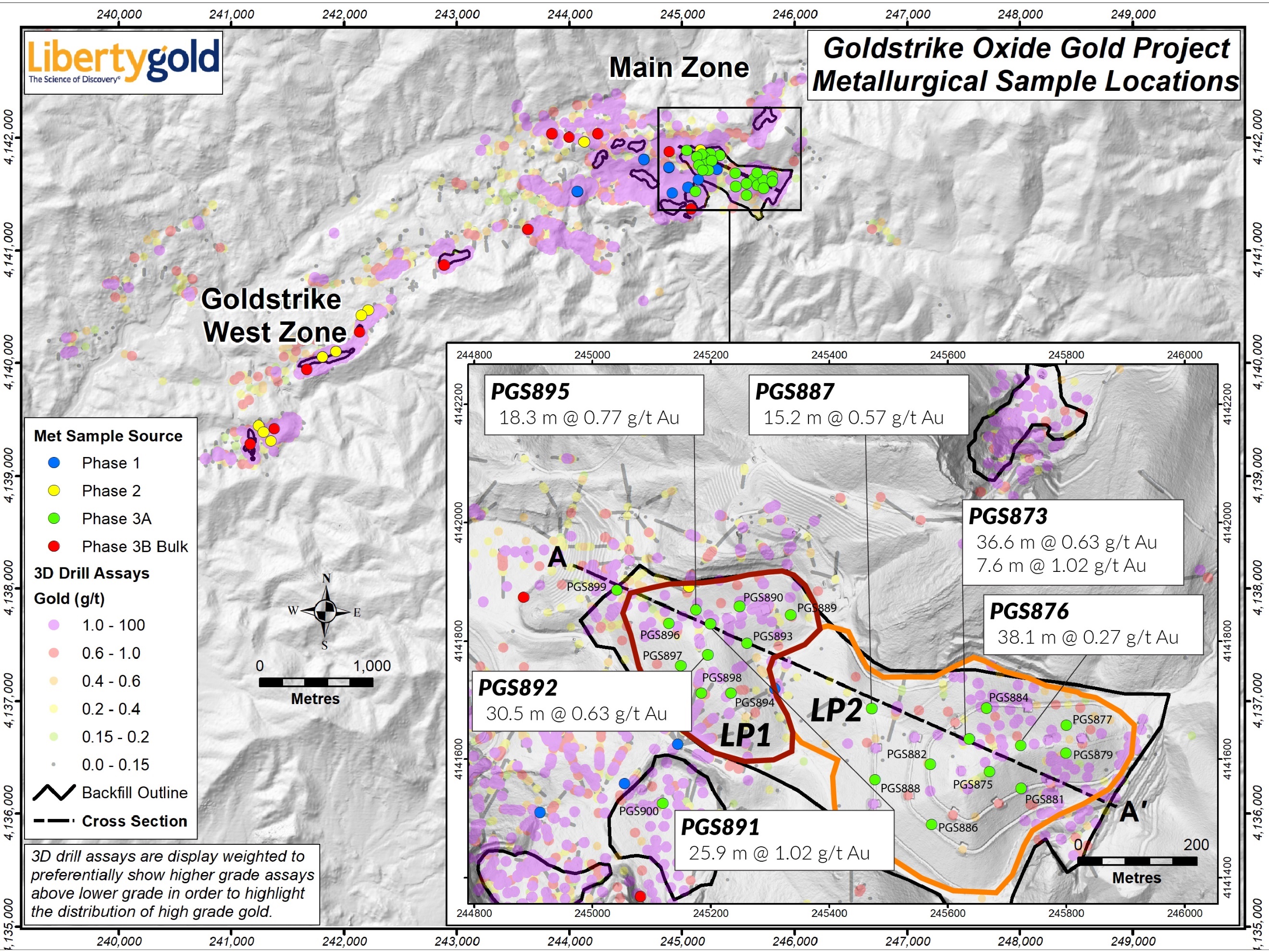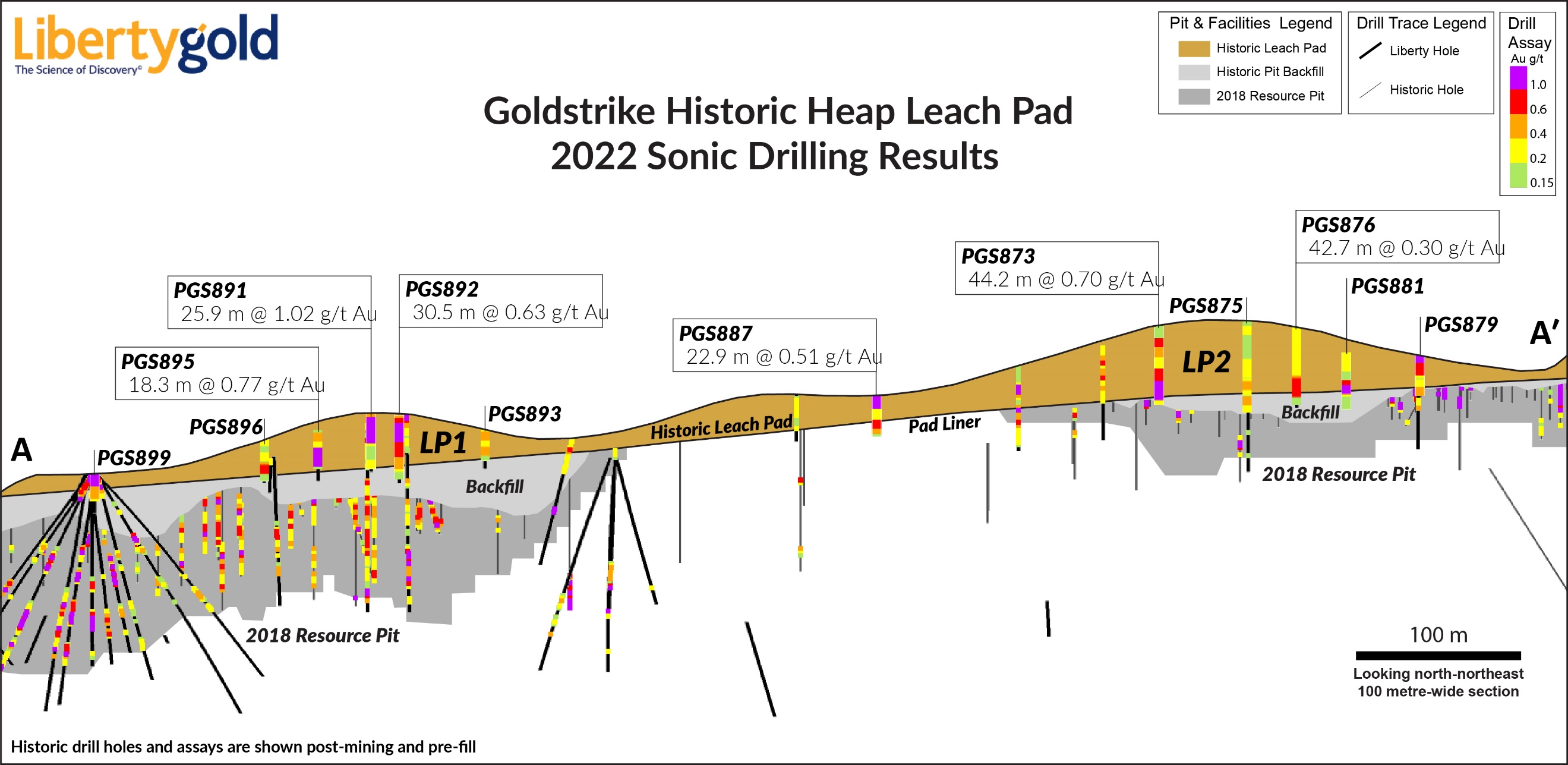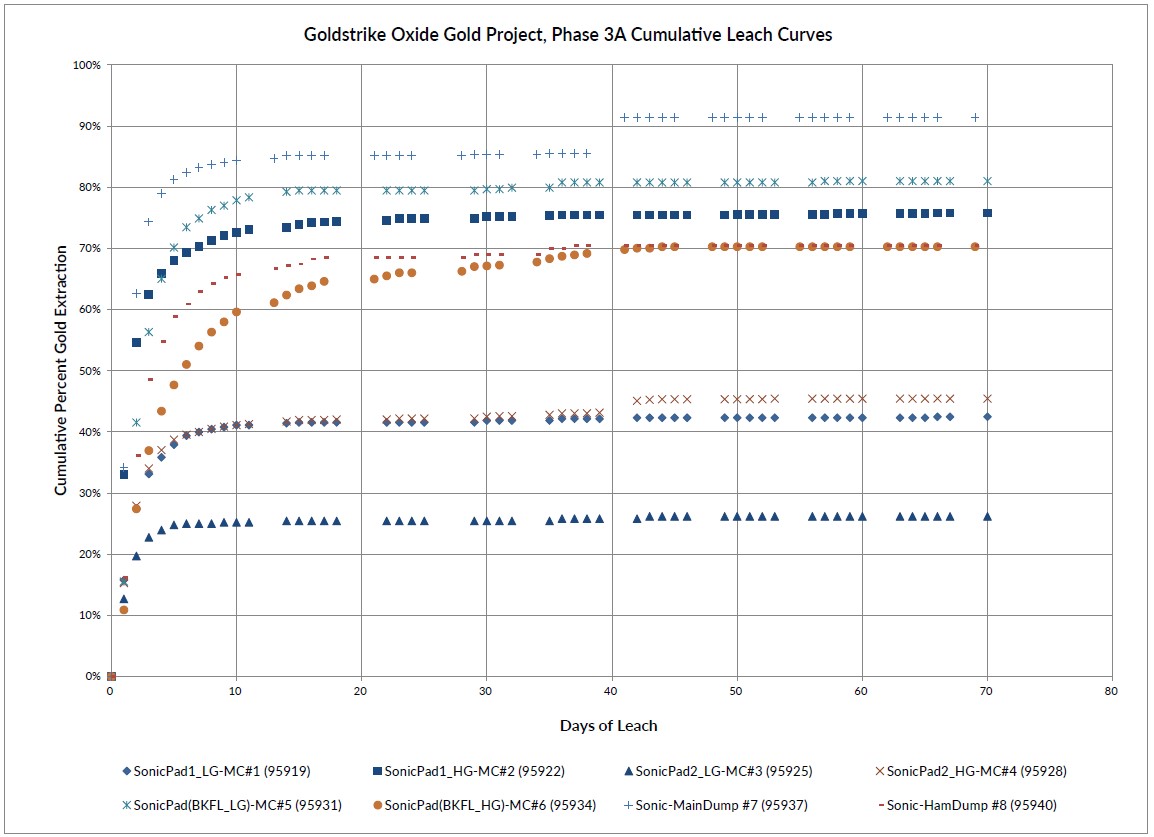Liberty Gold Reports on Progress at the Goldstrike Oxide Gold Project, Utah
VANCOUVER, B.C. – Liberty Gold Corp. (TSX: LGD; OTCQX: LGDTF) (“Liberty Gold” or the “Company”) is pleased to provide a progress update on activities related to process water supply, lands exchange and assessing gold recovery potential from the historic leach pads at its Goldstrike Oxide Gold Project (“Goldstrike”) in southwestern Utah.
HIGHLIGHTS
Process Water Supply
- Liberty Gold has retained Loughlin Associates and LRE Water, both experienced water exploration and evaluation consultant groups in the Great Basin, to design and execute a hydrological evaluation of potential water sources in the region.
- Desktop studies have commenced and field work is anticipated to start in July.
- Water supply requirements for a future mining operation range from 1,000 to 1,200 acre feet per annum (“AFA”); or ~39 to 47 litres per second (“l/s”), with an upper limit of 1,500 AFA (59 l/s).
Potential Land Exchange
- A block of land surrounding the Goldstrike deposit has been included in a proposed land exchange between The US Bureau of Land Management land exchange with the Utah School and Institutional Trust Lands Administration.
- The “Utah School and Institutional Trust Lands Exchange Act of 2023”, Senate Bill 1405, was presented to the US Congress in May and is currently in the committee stage in both the House and the Senate.
- The Company continues to monitor progress of this legislation through the approvals process.
Metallurgical Testwork
- Metallurgical studies at Goldstrike are testing the amenability of heap leaching the historically mined materials thus potentially providing an opportunity to process this early in a future heap leach mining operation, increasing mine life, and improving the project economics.
- Sonic drilling in the Hamburg/Main/Hassayampa area generated four composites of previously leached oxide ore from the two historic leach pads (“Leach Pads”), two composites of pad backfill (material underlying the Leach Pads, filling previously mined open pits) and two composites of waste rock materials.
- Metallurgical column leach testing was completed with key results including:
- Leach Pad Material
- Weighted average gold extraction[1] from column leach tests:
- Leach Pad 1 (run-of-mine) 62.0%
- Leach Pad 2 (-4 inch crush/agglomerate) 39.5%
- Weighted average gold extraction[1] from column leach tests:
- Backfill (material underlying the Leach Pads):
- Pad Backfill - High Grade 70.5%
- Pad Backfill - Low Grade 81.7%
- Waste Rock Material
- Main Dump 91.2%
- Hamburg North Dump 71.7%
- Leach Pad Material
- Historic production records[2] report that ~7.25 million tonnes (“Mt”) of oxide gold ore at an average grade of ~1.2 grams per tonne gold (“g/t Au”) was leached on the two pads during prior mining operations (1988 to 1994). Based on historic recoveries this indicates that there may be up to 70,000 ounces of gold remaining in the now closed and remediated historic heaps. Test results herein indicate that a portion of this gold could be amenable to extraction using conventional heap leaching.
- Leach Pads 1 & 2 and the underlying backfill are located directly over the Main/Hassayampa/Hamburg oxide gold resource and would need to be stripped in a potential future open pit mining operation to access the underlying oxide gold resource.
[1] Weighted average gold extraction is obtained using the following equation: (composite head grade (grams/tonnes) multiplied by extraction (%) for all head grades)/sum of all head grades. Using arithmetic averages tends to over-represent low grade composites and under-represent high grade composites.
[2] See the “Preliminary Economic Assessment and Independent Technical Report for the Goldstrike Project, Washington County, Utah USA”, effective February 8, 2018 and dated July 16, 2018 co-authored by Independent Qualified Persons Bob McCarthy, P.Eng. Valerie Sawyer, SME, David Rowe, CPG and Neil Winkelmann, FAusIMM of SRK Consulting (Canada) Inc.; Gary Simmons, MMSA of GL Simmons Consulting, LLC; James N. Gray, P.Geo. of Advantage Geoservices Ltd; George Lightwood, SME, Russell Browne, P.E. and Michael Bidart, P.E. of Golder Associates Inc.
Jason Attew, President and CEO for Liberty Gold said, “Since announcing the results of the Sonic drill program last August, we have made significant progress at our Goldstrike Project. Recent metallurgical test results indicate that the historically mined ore, which contains residual oxide gold, performs well under conventional oxide heap leach conditions. These materials could potentially add significant early value to a future leach operation at Goldstrike. As we bring key activities on water, land and metallurgical testwork to a close over the second half of 2023, we expect to position the project favourably for a decision on the next phase of development.”
METALLURGICAL TEST RESULTS – PHASE 3A
Historic Leach Pad Material (Column Leach Test Results)
- Results of metallurgical column testing at Goldstrike on leach pad material (>0.20 g/t Au) produced a column leach weighted average gold extraction of 49.3%, at an average gold grade of 0.58 g/t Au.
- Gold extraction was rapid, with >80% of the leachable gold extracted within the first 10 days.
- Reagent consumptions were low at 0.33 kilogram/tonne (“kg/t”) CN & 0.50 kg/t lime.
- Cement consumption was high and averaged 5.5 kg/t.
- Mineralized material (>0.20 g/t Au) tested came from a total of 348 metres (“m”) of sonic drilling in 21 sonic drill holes from Leach Pads “1” & “2” (see Figures 1 & 2).
- Based on historic records, the heaps were not adequately leached due to poor irrigation practices.
- Pad 1 was a run-of-mine heap, whereas Pad 2 was a -4” crush/agglomerate heap.
- Significant gold grades encountered in the sonic drilling (see press release dated August 9, 2022) suggest incomplete gold leaching occurred throughout the historic heaps and the results herein indicate that the residual gold remains readily soluble under heap leach conditions.
- Sonic drilling on the historic leach pads provided sufficient drill hole assay coverage to allow the potential inclusion of this material in a future mineral resource estimate.
- Testing is underway to characterize historic Leach Pad material crushed and screened at +12.5 millimeters (“mm”). It is anticipated that the +12.5 mm material could be used for new pad overliner and gravel drains, adding early ounces to the production profile.
Figure 1: Location plan of Sonic Drill holes on Historic Pads

Click here for Figure 1: https://libertygold.ca/images/news/2023/June/LocationPlanOfSonicDrillholes01062023.pdf
Figure 2: Cross-section through Historic Leach Pads (A-A' from Figure 1)

Click here for Figure 2: https://libertygold.ca/images/news/2023/June/CrossSectionThroughHistoricLeachPads01062023.pdf
Backfill Material
- Results of Phase 3A metallurgical column testing at Goldstrike on pits backfill material, underlying the Leach Pads produced are shown in Table 1.
- Leach kinetics are similar to in-situ material tested.
- Sonic Drill testing of the backfill material ranged from 5 to 26 meters below the historic pad and averaged 10 meters in thickness. Current drill density suggests that the oxide gold mineralization is widely distributed above resource cut-off grades.
Waste Rock Material
- Results of Phase 3A metallurgical column testing at Goldstrike on historic surficial waste rock from the Main and Hamburg North areas are shown in Table 1.
- Drill testing of this material indicates oxide gold mineralization is widely distributed above resource cut-off grades.
For a table of results of the Goldstrike Phase 3A variability composite test results, see Table 1 or click here:
https://libertygold.ca/images/news/2023/June/GoldstrikePhase3ACompositeTesting01062023.pdf
Table 1: Results, Goldstrike Phase 3A Historic Heap Composite Testing*

*Master Composites were classified as Low Grade (0.20 to 0.40 g/t Au) and High Grade (>0.40 g/t Au).
For a graph of results of the Goldstrike Phase 3A composite leach curves, see Figure 3 below or click here: https://libertygold.ca/images/news/2023/June/GoldstrikePhase3ALeachCurves01062023.pdf
Figure 3: Cumulative Leach Curves Confirm Rapid Leach Kinetics

Metallurgical Test Program
The metallurgical evaluation of the Goldstrike oxide gold mineralization consists of multiple phases of testwork including:
- Variability composite column tests from PQ drill core:
- Phase 1[3] (20 composites):
- 85.9% weighted average gold extraction, ranging from 55.0 to 97.0%
- Phase 2[4] (29 composites):
- 84.2% weighted average gold extraction, ranging from 46.4 to 95.0%
- Phase 3A (8 composites)
- Results released herein.
- Phase 3C (22 composites)
- Taken from PQ drill core drilled in 2022, these composites are currently in preparation for column testing. Infill drill holes cover Hamburg, Basin and Padre areas.
- Phase 1[3] (20 composites):
- Bulk Samples
- Phase 3B
- Comprising 11, 300-1,000 kilogram, bulk samples taken from outcropping oxide gold mineralisation is under leach in the lab with final results expected in early Q3.
- Phase 3B
[3] see press release dated August 18, 2020
[4] see press release dated October 27, 2021
Composites for all phases of test work were selected through consideration of alteration and gold grade and gold cyanide solubility to achieve a range of geo-metallurgical types. Composites were assembled in Elko, Nevada by Liberty Gold staff, utilizing one-half or three-quarter sawed PQ core or sonic samples, then shipped to Kappes, Cassiday and Associates in Reno, Nevada for metallurgical testing, comprising bottle rolls, column testing and geo-metallurgical characterization, including gold and silver assays, cyanide solubility, sulphur and carbon speciation, preg-robbing analysis, ICP geochemical assays, whole rock analysis, QXRD, load-permeability tests, modified SMC comminution testing, Bond Abrasion (Ai) testing and environmental chemistry.
All metallurgical work at Goldstrike has been supervised by Gary Simmons MMSA, formerly the Director of Metallurgy and Technology for Newmont Mining Corp. Mr. Simmons has managed or supervised many metallurgical testing programs on similar Carlin-style sedimentary rock-hosted oxide gold deposits throughout the Great Basin.
Metallurgical test work to be completed by year end on Goldstrike is anticipated to exceed pre-feasibility requirements. It is anticipated that one further phase of testwork is required to meet feasibility standards on current resources. Results continue to support a technically simple, low initial capital, low operating cost, combination of crush/agglomeration and ROM heap leach processing routes for oxide mineralization.
QUALIFIED PERSON
Peter Shabestari, P.Geo., Vice-President Exploration, Liberty Gold, is the Company's designated Qualified Person for this news release within the meaning of National Instrument 43-101 Standards of Disclosure for Mineral Projects ("NI 43-101") and has reviewed and validated that the information contained in the release is accurate.
ABOUT LIBERTY GOLD
Liberty Gold is focused on exploring for and developing open pit oxide deposits in the Great Basin of the United States, home to large-scale gold projects that are ideal for open-pit mining. This region is one of the most prolific gold-producing regions in the world and stretches across Nevada and into Idaho and Utah. We know the Great Basin and are driven to discover and advance big gold deposits that can be mined profitably in open-pit scenarios.
For more information, visit libertygold.ca or contact:
Susie Bell, Manager, Investor Relations
Phone: 604-632-4677 or Toll Free 1-877-632-4677
This email address is being protected from spambots. You need JavaScript enabled to view it.
QUALITY ASSURANCE – QUALITY CONTROL
Drill composites were calculated using a cut-off of 0.10 g/t Au. Drill intersections are reported as drilled thicknesses. True widths of the mineralized intervals vary between 30% and 100% of the reported lengths due to varying drill hole orientations but are typically in the range of 50% to 90% of true width. Drill samples were assayed by ALS Limited in Reno, Nevada for gold by Fire Assay of a 30 gram (1 assay ton) charge with an AA finish, or if over 5.0 g/t Au were re-assayed and completed with a gravimetric finish. For these samples, the gravimetric data were utilized in calculating gold intersections. For any samples assaying over 0.10 parts per million an additional cyanide leach analysis is done where the sample is treated with a 0.25% NaCN solution and rolled for an hour. An aliquot of the final leach solution is then centrifuged and analyzed by Atomic Absorption Spectroscopy. QA/QC for all drill samples consists of the insertion and continual monitoring of numerous standards and blanks into the sample stream, and the collection of duplicate samples at random intervals within each batch. Selected holes are also analyzed for a 51 multi-element geochemical suite by ICP-MS. ALS Geochemistry-Reno is ISO 17025:2005 Accredited, with the Elko and Twin Falls prep lab listed on the scope of accreditation.
All statements in this press release, other than statements of historical fact, are "forward-looking information" with respect to Liberty Gold within the meaning of applicable securities laws, including statements that address potential quantity and/or grade of minerals, the potential size of the mineralized zone, the proposed timing of exploration and development plans, the expansion and future resource growth expected at Goldstrike, expected capital costs at Goldstrike, the potential processing routes, expected gold recoveries from the Goldstrike mineralized material, the water supply requirements at Goldstrike,, the 2023 work program and the results thereof, the timing and results of any planned development work at Goldstrike. Forward-looking information is often, but not always, identified by the use of words such as "seek", "anticipate", "plan", "continue", "planned", "expect", "project", "predict", "potential", "targeting", "intends", "believe", "potential", and similar expressions, or describes a "goal", or variation of such words and phrases or state that certain actions, events or results "may", "should", "could", "would", "might" or "will" be taken, occur or be achieved. Forward-looking information is not a guarantee of future performance and is based upon a number of estimates and assumptions of management at the date the statements are made including, among others, assumptions about future prices of gold, and other metal prices, currency exchange rates and interest rates, availability of water sources, favourable operating conditions, political stability, obtaining governmental approvals and financing on time, obtaining renewals for existing licenses and permits and obtaining required licenses and permits, labour stability, stability in market conditions, availability of equipment, the availability of drill rigs, successful resolution of disputes and anticipated costs and expenditures. Many assumptions are based on factors and events that are not within the control of Liberty Gold and there is no assurance they will prove to be correct.
Such forward-looking information, involves known and unknown risks, which may cause the actual results to be materially different from any future results expressed or implied by such forward-looking information, including, risks related to the interpretation of results and/or the reliance on technical information provided by third parties as related to the Company’s mineral property interests; changes in project parameters as plans continue to be refined; current economic conditions; future prices of commodities; possible variations in grade or recovery rates; the costs and timing of the development of new deposits; failure of equipment or processes to operate as anticipated; the failure of contracted parties to perform; the timing and success of exploration activities generally; the timing of the publication of any updated resources; delays in permitting; possible claims against the Company; labour disputes and other risks of the mining industry; delays in obtaining governmental approvals, financing or in the completion of exploration as well as those factors discussed in the Annual Information Form of the Company dated March 26, 2023 in the section entitled "Risk Factors", under Liberty Gold’s SEDAR profile at www.sedar.com.
Although Liberty Gold has attempted to identify important factors that could cause actual actions, events or results to differ materially from those described in forward-looking information, there may be other factors that cause actions, events or results not to be as anticipated, estimated or intended. There can be no assurance that such information will prove to be accurate as actual results and future events could differ materially from those anticipated in such statements. Liberty Gold disclaims any intention or obligation to update or revise any forward-looking information, whether as a result of new information, future events or otherwise.

